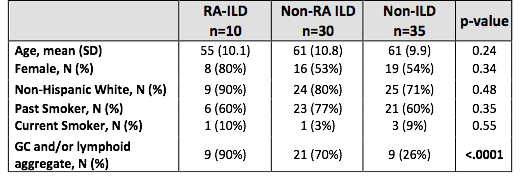Session Information
Date: Sunday, November 5, 2017
Title: Rheumatoid Arthritis – Human Etiology and Pathogenesis Poster I
Session Type: ACR Poster Session A
Session Time: 9:00AM-11:00AM
Background/Purpose:
Antibodies to citrullinated protein antigens (ACPA) precede the development of rheumatoid arthritis (RA) and may be generated in the lung of established and preclinical RA patients. An association has been demonstrated between serum ACPA and ectopic lymphoid tissue (ELT) in the lung of RA and non-RA patients with lung disease, suggesting that ELT may be a mechanism for ACPA generation in the lung (Rangel-Moreno 2016, Brown ACR 2015, Abstract #963). To further explore the mucosal basis of ACPA, we examined ACPA isotypes and lung histopathology in patients with and without RA.
Methods:
Using materials from the NIH’s Lung Tissue Resource Consortium (LTRC) we evaluated lung biopsies and serum samples from 10 RA patients with interstitial lung disease (RA-ILD), 30 non-RA patients with ILD (Non-RA ILD) and 35 non-RA patients with emphysema or airway disease (Non-ILD). Serum was tested for IgA and IgG ACPA isotypes using the CCP3 antigen plate (Inova, research only). Lung tissue was evaluated by a pathologist blinded to patientsÕ clinical status to determine the presence of ELT defined as germinal centers (GCs) or lymphoid aggregates. Logistic regression was used to determine associations of isotype levels with ELT.
Results:
Patients’ characteristics are presented in the Table. There were significantly higher mean IgG ACPA levels in RA cases compared to non-RA patients (Figure). Mean IgA ACPA levels were higher compared to IgG in non-RA ILD (83.2 vs. 26.6) and non-ILD patients (40.3 vs. 5.3), although in RA patients, there was no significant difference in isotype levels (Figure). There was an association between serum IgA ACPA levels and ELT in all subjects (p=0.01), but not IgG. Smoking, age, and gender were not significantly associated with ELT; however, RA was significantly associated with ELT (p=0.03). To evaluate the relationship between serum ACPA isotypes and ELT in absence of RA, an analysis of only non-RA subjects showed that IgA ACPA levels remained significantly associated with ELT (OR 1.14 for every 10-unit increase in IgA; 95% CI 1.01-1.28; p=0.02).
Conclusion:
Our findings support a link between serum ACPA and lung ELT. Given the strongest association was seen between ELT and IgA ACPA for non-RA subjects, it may be that IgA ACPA are related to ELT even in absence of articular disease. The strong association of IgG ACPA with RA may indicate that this isotype is a marker for RA-specific articular processes. Future studies should assess the mechanisms underlying these findings, and how differentiating IgA and IgG ACPA may help in the management of RA and non-RA patients with lung disease.
To cite this abstract in AMA style:
Kelmenson LB, Demoruelle MK, Cool CD, Deane KD. Ectopic Lymphoid Tissue in the Lung Is Uniquely Associated with the ACPA IgA Isotype Even in Absence of Classifiable RA [abstract]. Arthritis Rheumatol. 2017; 69 (suppl 10). https://acrabstracts.org/abstract/ectopic-lymphoid-tissue-in-the-lung-is-uniquely-associated-with-the-acpa-iga-isotype-even-in-absence-of-classifiable-ra/. Accessed .« Back to 2017 ACR/ARHP Annual Meeting
ACR Meeting Abstracts - https://acrabstracts.org/abstract/ectopic-lymphoid-tissue-in-the-lung-is-uniquely-associated-with-the-acpa-iga-isotype-even-in-absence-of-classifiable-ra/


